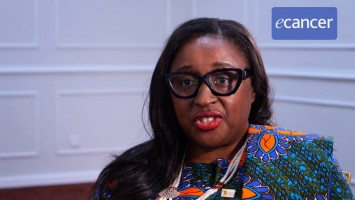You can go very many ways with this. One of the big challenges is that we still haven’t really figured out what the consensus is on how a geriatric assessment should be – which topics should be included, how they should be assessed. So what we’re seeing is that there are a lot of different… each study uses a different geriatric assessment and it makes it very difficult to compare it across the line. So a consensus is a big challenge; how to actually translate a geriatric assessment to a treatment decision - in first suggestions it was simplified to a go, slow-go, no-go but it’s not that simple because for each treatment these choices will be different so that’s an important challenge. And I was just in the previous talk and I heard, again, that geriatric assessments are time-consuming and that’s probably the biggest challenge we have to overcome because geriatric assessments are time-consuming but they’re not necessarily expensive and we don’t feel very limited in asking for another PET-CT or a more complicated MRI which are probably much more expensive than the actual geriatric assessment. So that’s probably the biggest challenge - that we need to accept that it takes some time but it’s worth it. We can spend €30,000 or dollars on chemotherapy but we can’t take twenty minutes to assess if a patient can tolerate the treatment, that doesn’t make sense to me.
What do you think are the issues causing this?
It’s that the oncologists or the surgeons don’t have the time so you’d need to train a nurse to do it. You don’t have the nurse but we didn’t have a PET-CT either some time ago and now we do. If we all take a stand and say, ‘This is necessary,’ in the end it will be cost effective, it’s been demonstrated to be cost effective. But if we just accept that it’s time consuming and we don’t have that time so we don’t do it then it will never be implemented.
Is there the potential for guidelines to come out of this meeting or a future meeting?
SIOG has made it very clear that this is something that should be implemented but it’s on a local level, you need to discuss it with your insurance companies if they want to cover it, if they’re willing to cover it. If you can explain it to them that’s much more important to make it, if you take a stand as an oncologist to say, ‘I’m not going to give this treatment until I know if this patient can tolerate it.’
What would you recommend going forward?
The SIOG guidelines are a good starting point because they’re very clear on both the value and the need for geriatric assessment. There is a lot of literature out there that actually demonstrates that it’s worthwhile to do it so we just need to unite in this. That’s probably the most important advice, recommendation.








